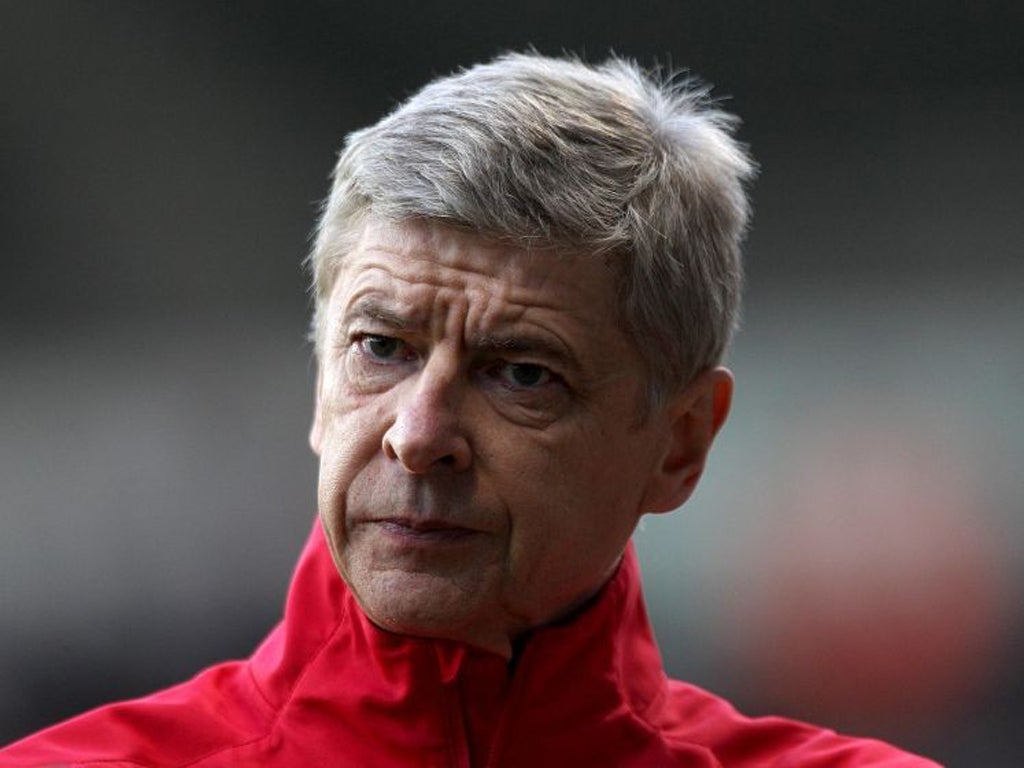James Lawton: Wenger can't restore faith if he fails to see the truth

Your support helps us to tell the story
From reproductive rights to climate change to Big Tech, The Independent is on the ground when the story is developing. Whether it's investigating the financials of Elon Musk's pro-Trump PAC or producing our latest documentary, 'The A Word', which shines a light on the American women fighting for reproductive rights, we know how important it is to parse out the facts from the messaging.
At such a critical moment in US history, we need reporters on the ground. Your donation allows us to keep sending journalists to speak to both sides of the story.
The Independent is trusted by Americans across the entire political spectrum. And unlike many other quality news outlets, we choose not to lock Americans out of our reporting and analysis with paywalls. We believe quality journalism should be available to everyone, paid for by those who can afford it.
Your support makes all the difference.Arsène Wenger has suffered many harsh cuts recently but maybe the cruellest thus far came when he was caught by TV seething in his box made for one on the Swansea touchline. The man on the microphone couldn't resist a comparison with Victor – "I don't believe it" – Meldrew.
The biggest problem, of course, was that most of the rest of us could – believe it, this is.
Of course, we could believe that Swansea City, playing with the conviction of a team who have seen their future and have the strong suspicion that it may well work, were capable of cutting through an Arsenal defence which has been allowed to slip into such monumental disrepair.
To be fair to the embattled Arsenal manager (right), his rant against the referee for what he considered a dubious penalty was punctuated by acknowledgement that the Swansea victory was about something a little more than official incompetence. "We were playing against a good team," he conceded.
The trouble is – and it is of the kind that made the Meldrew crack so wounding for all those who believe that Wenger's contribution not only to Arsenal Football Club but to the entire English game would remain immense even if he never wins another match – is that a great football man increasingly resembles someone in denial.
His demeanour suggests that reality has become something of a mystery. He found it a little unbelievable that Arsenal lost. But of course it wasn't – not with Per Mertesacker palpably off the pace, Theo Walcott scoring a good goal but in all other respects failing to impress the England manager Fabio Capello that he is a young man who knows precisely where he is going, and Andrei Arshavin remaining a ghost of the player who so illuminated the 2008 European Championship.
It didn't really help that if Arshavin is truly a man of Arsenal's past – and where would you scrape up an iota of evidence to disprove the theory? – he was replaced by Thierry Henry, whose return to the place of his greatest deeds began to take on nightmarish possibilities when he urged his team-mates into the maw of some extremely hostile fan sentiment.
If there was a lesson to be learned it was surely that Wenger and the time-traveller Henry are tilling some very meagre ground if they expect much credit for what happened on Sunday. Today, Wenger can rail against the facts of life as desperately as he likes, but the truth is that he does so at the increasing risk of ridicule.
It is certainly a shocking denouement. Eighteen months ago at the South African World Cup, Wenger was a ubiquitous and urbane presence; Cesc Fabregas and Samir Nasri had yet to defect, the appalling toppling of hopes in the early spring, which was like a clatter of disrupted skittles, had yet to come with such devastating force, though there was the heaviest portent when Birmingham City were allowed to win the Carling Cup and Fabregas, from the sidelines, wore the expression of someone who could no longer believe.
How does Wenger reconstruct such belief? Not by castigating referees, not by receding into the mantle of a victim. He has to accept that the cycle of renewal has not worked, that the reappearance of someone like Henry is not a diversion but a terrible reminder of the slippage that has come since the night in Paris five and a half years ago when the great Frenchman was one pull of the trigger away from crowning victory over Barcelona in the Champions League final.
Now, four points out of the top four, it is surely time not to talk up the future but live in the present. Maybe Aaron Ramsey can seize some kind of future, and especially with the support of Jack Wilshere and Thomas Vermaelen, but if you cannot defend, if that aspect of your game is in ruins, a most grievous fault line isn't going to disappear.
This reality was imposed quite brilliantly by a team new to the top flight, one that their impressive young manager, Brendan Rodgers, rather bitterly pointed out has not exactly enjoyed a deluge of recognition.
That will surely change in the next few days and weeks but Rodgers doesn't need warning about the dangers that will come with the praise. No doubt he will tell his players that they are only as good as their last performance. At the moment, Arsène Wenger can only envy him such an opportunity.
If he said that to his own team it would be an insult of, well, Meldrew proportion.
Join our commenting forum
Join thought-provoking conversations, follow other Independent readers and see their replies
Comments